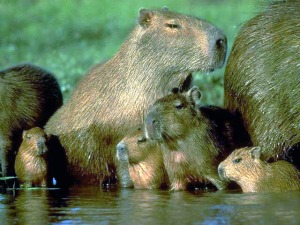
Venezuela’s plains region is home to the capybara (in Spanish, chigüire), which is the world’s largest rodent. These herbivores can weigh up to 100 pounds and live most of their lives in water. When they are born, they actually swim better than they walk, according to a zookeeper in Parque del Este in Caracas.
Sadly, chigüires are sometimes hunted and eaten for Easter dinner despite the fact that, during Lent, there is a religious prohibition against eating meat. During the time of colonization, the native chigüire was misrepresented to the Catholic church by the Spanish conquistadors, who wrote to the church officials for permission to eat the animal, which was unknown in Europe. The Spaniards said that chigüis lived in the water and resembled fish, conveniently leaving the hair and four feet out of the description.
By and large, chigüires are friends, not food, and people in the llanos keep them as pets. Recently, the chigüire has become a subject for popular art, and can be found on t-shirts and logos everywhere in Venezuela.
Spanish-speakers will enjoy a popular sytirical news blog in Venezuela known as El Chigüire Bipolar.
 Venezuela defeated Colombia yesterday in the
Venezuela defeated Colombia yesterday in the 



 Thanks to the
Thanks to the  Last week, over Thanksgiving, it’s safe to say that some Latin Americans may have given thanks for increased cooperation among countries in the region.
Last week, over Thanksgiving, it’s safe to say that some Latin Americans may have given thanks for increased cooperation among countries in the region. With the people of Paraguay still celebrating last Friday’s swearing-in of the new President and former “Bishop of the Poor” Fernando Lugo, a dozen new accords signed between that country and Venezuela are making the future look even brighter.
With the people of Paraguay still celebrating last Friday’s swearing-in of the new President and former “Bishop of the Poor” Fernando Lugo, a dozen new accords signed between that country and Venezuela are making the future look even brighter. Last week, Venezuela hosted the 7th Conference of Information Ministers of the Movement of Non-Aligned Countries. The event brought representatives from 80 countries together to discuss common projects.
Last week, Venezuela hosted the 7th Conference of Information Ministers of the Movement of Non-Aligned Countries. The event brought representatives from 80 countries together to discuss common projects. Venezuela is sending more humanitarian aid to Haiti after food riots broke out last week in that country, the poorest in the Western Hemisphere. President Chavez dispatched a fleet of airplanes yesterday carrying
Venezuela is sending more humanitarian aid to Haiti after food riots broke out last week in that country, the poorest in the Western Hemisphere. President Chavez dispatched a fleet of airplanes yesterday carrying 
